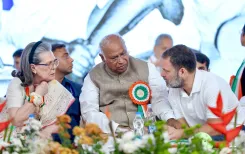Is India Set to Become the Centre of Gravity in the New World Economic Order?

Synopsis
Key Takeaways
- India is well-positioned to emerge as a hub in a new, multi-polar global economy.
- Challenges from protectionism and global instability remain.
- Innovation and manufacturing are critical for India's economic growth.
- Aligning corporate strategies with national objectives can yield benefits.
- India's stable democracy enhances its appeal as a global partner.
Mumbai, June 30 (NationPress) The shift of the USA towards de-globalisation might paradoxically pave the way for a new kind of globalisation that is multi-polar, regional, and fueled by domestic needs, positioning India as a key player, according to industrialist Anand Mahindra.
In his speech to shareholders at the Mahindra & Mahindra (M&M) Annual Report for 2024-25, Mahindra stated that globalisation is transforming, moving away from a US-centric model and China-centric supply chains to embrace multi-polar and regional collaborations.
With diminishing US dominance due to structural and political uncertainties, new capital destinations are beginning to emerge, he noted.
The diversification of global supply chains from China is fostering new trade partnerships, and the potential for lower tariff barriers among regional allies could enhance free trade, thereby reshaping the international trade landscape, Mahindra emphasized.
Recent negotiations on tariffs between the US and China, alongside strengthened trade relationships with the UK, indicate a pragmatic dimension to US trade policy, which combines elements of protectionism with strategic global interaction.
“Nevertheless, a significant decoupling between the US and China appears increasingly likely,” he pointed out.
Mahindra acknowledged that India will also encounter challenges amidst the ongoing global turbulence and the rising tide of protectionism.
“Whether a nation or a business, the true victors will be those capable of adeptly navigating uncertainty and ambiguity — those who demonstrate resilience,” Mahindra articulated.
He noted that China's adversarial posture might open avenues for India to establish itself as an alternative in the supply chain — a long-term aspiration for Indian enterprises. Emphasis on innovation and R&D is likely to receive renewed attention, while manufacturing could regain its prominence.
“Restrictions on China and elevated tariffs on competing nations could unveil new markets for Indian exports. The potential is there, but realizing it demands a concerted effort towards manufacturing and a noticeable increase in private investments,” he explained.
“Speed and agility are vital, as countries like the Philippines and Vietnam are already positioning themselves as future manufacturing hubs,” he remarked.
Companies can gain from aligning their strategies with national priorities, particularly in sectors such as renewable energy, defense, and digital infrastructure, which are emerging as sunrise industries in India, he emphasized.
Mahindra also underscored that India is a stable democracy, generally perceived as a reliable partner, supported by a robust military that remains apolitical.
In reference to Pakistan, Mahindra remarked, “The situation with our provocative neighbor remains unstable, yet I am optimistic that we can set boundaries to our tolerance while continuing our route towards economic advancement.”






